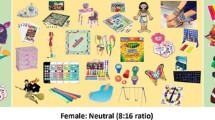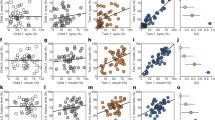Abstract
This study investigated sex differences in interest in infants among children, adolescents, young adults, and older individuals. Interest in infants was assessed with responses to images depicting animal and human infants versus adults, and with verbal responses to questionnaires. Clear sex differences, irrespective of age, emerged in all visual and verbal tests, with females being more interested in infants than males. Male interest in infants remained fairly stable across the four age groups, whereas female interest in infants was highest in childhood and adolescence and declined thereafter, particularly for the responses to visual stimuli. The observed developmental changes in female interest in infants are consistent with the hypothesis that they represent a biological adaptation for parenting.
Similar content being viewed by others
References
Berman, P. W. 1976 Social Context as a Determinant of Sex Differences in Adults’ Attraction to Infants. Developmental Psychology 12:365–366.
1980 Are Women More Responsive Than Men to the Young? A Review of Developmental and Situational Variables. Psychological Bulletin 88:668–695.
Berman, P. W., P. Cooper, P. Mansfield, S. Shields, and J. Abplanalp 1975 Sex Differences in Attraction to Infants: When Do They Occur? Sex Roles 1:311–318.
Berman, P. W., V. Goodman, V. L. Sloan, and L. Fernander 1978 Preference for Infants among Black and White Children: Sex and Age Differences. Child Development 49:917–919.
Berman, P. W., L. D. Monda, and R. P. Myerscough 1977 Sex Differences in Young Children’s Responses to an Infant: An Observation within a Day-Care Setting. Child Development 48:711–715.
Berman, P. W., V. L. Smith, and V. Goodman 1983 Development of Sex Differences in Response to an Infant and to the Caretaker Role. Journal of Genetic Psychology 143:283–284.
Blakemore, J. E. O. 1981 Age and Sex Differences in Interaction with a Human Infant. Child Development 52:386–388.
1985 Interaction with a Baby by Young Adults: A Comparison of Traditional and Feminist Men and Women. Sex Roles 13:405–411.
1990 Children’s Nurturant Interactions with Their Infant Siblings: An Exploration of Gender Differences and Maternal Socialization. Sex Roles 22:43–57.
1991 Adults’ Evaluations of Children Caring for a Baby: The Effects of Gender and Behavior. Sex Roles 24:541–549.
1998 The Influence of Gender and Parental Attitudes on Preschool Children’s Interest in Babies: Observations in Natural Settings. Sex Roles 38:73–94.
Collaer, M. L., and M. Hines 1995 Human Behavioral Sex Differences: A Role for Gonadal Hormones during Early Development? Psychological Bulletin 118:55–107.
Eagly, A. H. 1987 Sex Differences in Social Behavior: A Social-Role Interpretation. Hillsdale, New Jersey: Erlbaum.
Edwards, C. P. 1993 Behavioral Sex Differences in Children of Diverse Cultures: The Case of Nurturance to Infants. In Juvenile Primates: Life History, Development, and Behavior, M. E. Pereira and L. A. Fairbanks, eds. Pp. 327–338. New York: Oxford University Press.
Fairbanks, L. A. 1990 Reciprocal Benefits of Allomothering for Female Vervet Monkeys. Animal Behaviour 40:553–562.
1996 Individual Differences in Maternal Styles: Causes and Consequences for Mothers and Offspring. Advances in the Study of Behavior 25:579–611.
Feldman, S. S., and S. C. Nash 1978 Interest in Babies during Young Adulthood. Child Development 49:617–622.
1979a Changes in Responsiveness to Babies during Adolescence. Child Development 50:942–949.
1979b Sex Differences in Responsiveness to Babies among Mature Adults. Developmental Psychology 15:430–436.
Feldman, S. S., S. C. Nash, and C. Cutrona 1977 The Influence of Age and Sex on Responsiveness to Babies. Developmental Psychology 13:675–676.
Fullard, W., and A. M. Reiling 1976 An Investigation of Lorenz’s “Babyness.” Child Development 47:1191–1193.
Goldberg, S., S. L. Blumberg, and A. Kriger 1982 Menarche and Interest in Infants: Biological and Social Influences. Child Development 53:1544–1550.
Goy, R. W., and C. H. Phoenix 1971 The Effects of Testosterone Propionate Administered before Birth on the Development of Behaviour in Genetic Female Rhesus Monkeys. In Steroid Hormones and Brain Function, C. H. Sawyer and R. A. Gorski, eds. Pp. 193–201. Berkeley: University of California Press.
Harlow, H. F. 1971 Learning to Love. San Francisco: Albion.
Lancaster, J. B. 1971 Play Mothering: The Relations between Juvenile Females and Young Infants among Free-Ranging Vervet Monkeys (Cercopithecus aethiops). Folia Primatologica 15:161–182.
Leveroni, C., and S. A. Berenbaum 1998 Early Androgen Effects on Interest in Infants: Evidence from Children with Congenital Adrenal Hyperplasia. Developmental Neuropsychology 14:321–340.
Lorenz, K. 1971 Part and Parcel in Animal and Human Societies. In Studies in Animal and Human Behavior, Vol. II, by K. Lorenz. Pp. 115–195. Cambridge: Harvard University Press.
Lovejoy, J., and K. Wallen 1988 Sexually Dimorphic Behavior in Group-Housed Rhesus Monkeys (Macaca mulatta) at 1 Year of Age. Psychobiology 16:348–356.
Maccoby, E. E., and C. N. Jacklin 1975 The Psychology of Sex Differences. Stanford: Stanford University Press.
Maestripieri, D. 1994 Social Structure, Infant Handling, and Mothering Styles in Group-Living Old World Monkeys. International Journal of Primatology 15:531–553.
1999 The Biology of Human Parenting: Insights from Nonhuman Primates. Neuroscience and Biobehavioral Reviews 23:411–422.
2001 Biological Bases of Maternal Attachment. Current Directions in Psychological Science 10:79–83.
Maestripieri, D., and J. L. Zehr 1998 Maternal Responsiveness Increases during Pregnancy and after Estrogen Treatment in Macaques. Hormones and Behavior 34:223–230.
Nash, S. C., and S. S. Feldman 1980 Responsiveness to Babies: Life-Situation-Specific Sex Differences in Adulthood. Sex Roles 6:751–758.
Tooby, J., and L. Cosmides 1992 The Psychological Foundations of Culture. In The Adapted Mind, J. H. Barkow, L. Cosmides, and J. Tooby, eds. Pp. 19–136. New York: Oxford University Press.
Trotman Reid, P., C. S. Tate, and P. W. Berman 1989 Preschool Children’s Self-presentations in Situations with Infants: Effects of Sex and Race. Child Development 60:710–714.
Wallen, K. 1996 Nature Needs Nurture: The Interaction of Hormonal and Social Influences on the Development of Behavioral Sex Differences in Rhesus Monkeys. Hormones and Behavior 30:364–378.
Author information
Authors and Affiliations
Corresponding author
Additional information
This study was supported by NIH grants R01-MH57249, R01-MH62577, and K02-MH63097.
Dario Maestripieri, Ph.D., is an assistant professor of Human Development and Evolutionary Biology at the University of Chicago. He has broad research interests in behavior, development, and evolution, and conducted research on primate parenting and development at the University of Cambridge and at the Yerkes Regional Primate Research Center before moving to Chicago. Suzanne Pelka is a graduate student in Human Development at the University of Chicago.
Rights and permissions
About this article
Cite this article
Maestripieri, D., Pelka, S. Sex differences in interest in infants across the lifespan. Hum Nat 13, 327–344 (2002). https://doi.org/10.1007/s12110-002-1018-1
Received:
Accepted:
Issue Date:
DOI: https://doi.org/10.1007/s12110-002-1018-1




